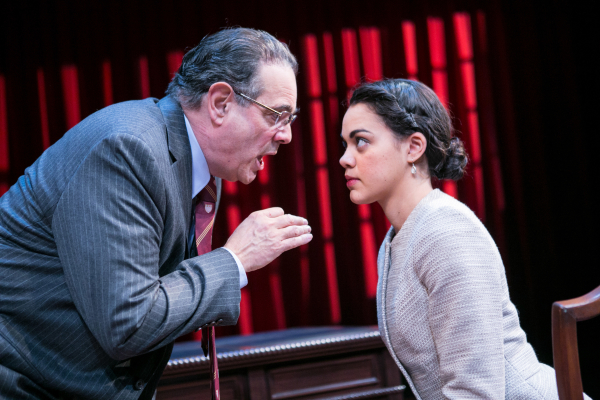The Originalist

(© C. Stanley Photography)
Arena Stage has opened a riveting, world-premiere production of John Strand's The Originalist. Strand chooses as his main character an outspoken member of the United States Supreme Court, Antonin Scalia, to examine the issue of the polarization of politics in contemporary America.
The play begins in 2012 in Washington, D.C., with Scalia (Edward Gero), almost 70 years old, introducing himself proudly as a model of unpopular thinking. He delights in opera, in his large Italian-American family, and in his belief that he is "not an ideologue" but a "monument to the best thinking of the last 250 years." "I tell people what they don't want to hear," says Scalia triumphantly.
Into Scalia's comfortable life enters a young Harvard Law School graduate, Cat (Kerry Warren), whose beliefs differ radically from Scalia's. When Cat becomes Scalia's law clerk, the play turns into a verbal boxing match. Although at first it seems that a recent graduate could not possibly succeed against a judge with half a century of experience, in fact, Scalia and Cat mutually benefit from their altercations. He is sufficiently moved by her brilliance and offers to teach her to shoot a rifle.
The latter part of the play moves into 2014, a time when gay marriage is being debated in the Supreme Court. Scalia has Cat and her Harvard nemesis, Brad (Harlan Work), prepare his arguments.
The play, based in part on Scalia's written opinions, is far from a record of his legal decisions. Though it reveals details of his personal life, it is not a biography. Strand skillfully uses Scalia and Cat to generate a conversation that examines the distance between two viewpoints: that the Constitution is a static document ("originalism") and that it is a "living" document whose meaning changes over time.
Gero is brilliant as the blunt, aggravating, funny, intense, and fierce Scalia. He moves easily around the set, using his hands expressively to communicate complex thoughts. He demonstrates a broad variety of emotions and speaks with a well-modulated voice to capture Scalia as performer.
Warren is excellent in the role of Cat, asking Scalia from the beginning to consider the "heart" not simply the "mind" of his arguments. As their intellectual duels grow more intense, Warren subtly transforms from an admiring clerk into something of a conscience, from attacking her employer for smoking to demanding to know how Scalia really felt about being passed over for the role of Chief Justice.
Work plays his small but significant role as the jealous and spiteful Brad well, becoming believable as physically and socially dangerous to Cat.
Molly Smith directs the production with care and precision. Entrances and exits are clean and crisp, and the arguments move rapidly. Misha Kachman's set uses elements derived from opera, primarily a red velvet curtain with gold trim and elaborate crystal chandeliers that stand out in the background. Running perpendicular to the curtain is a wide parquet floor, where most of the action happens. For much of the play, Gero speaks without props, but when the scene shifts to his office, a huge wooden desk slides out from behind the curtain. Lighting designer Colin Bills sets the tone for Cat's scenes with her father in a hospital by projecting a black horizontal shape for the bed.
Familiar Italian opera music plays as Gero enters for each scene. Composer Eric Shimelonis has done a marvelous job of coordinating the operas to Justice Scalia's mood.
Located close to the Supreme Court building, this production feels even more vital, and Smith's choice to produce this timely play – the Supreme Court will rule finally on gay marriage in June – is a reminder of her commitment to make Arena Stage stand out as a theater located in the nation's capital.
Apart from the details of the play, a larger issue remains regarding our ability to find a cooperative midpoint in politics, if both sides retreat into extremist camps. Although Strand doesn't give a roadmap to finding a middle ground, he begins an intelligent conversation about where interested parties might start looking.











